News
What You Must Know About Anthrax

Eko Hot Blog reports that the Federal Government on July 17, 2023 confirmed the first case of anthrax in a farm in Niger State.
According to The Sun, the Federal Ministry of Agriculture and Rural Development (FMARD) said the confirmed case of anthrax disease in a mixed livestock farm in the state was the first animal case to be reported in Nigeria since the beginning of the West Africa outbreak in Ghana in June 2023.
Editors Pick
-
JUST IN: FG, Niger Govt Flags-Off Vaccination Against Anthrax Disease (Video)
-
Anthrax: NCDC DG, Adetifa, Warns Against Consuming Ponmo, Citing Serious Health Risks
What Is Anthrax Disease?
According to experts, anthrax is a severe disease caused by the bacteria known as Bacillus anthracis. It can affect both humans and animals, including wild animals and livestock such as cows, pigs, camels, sheep, goats, etc.
The bacteria, which exist as spores, can be found in the soil, wool, or hair of infected animals.
Anthrax spores are resistant to extreme conditions and can survive in the soil or environment for decades, making controlling or eradicating the disease very difficult. The spores are brought to the surface by wet weather, by deep digging, or when eaten by livestock or wild animals when they graze.
In a statement jointly signed by the Chief Veterinary Officer of Nigeria, FMARD, Dr Columba Vakuru and Director General, Nigeria Centre for Disease Control (NCDC), Dr Ifedayo Adetifa, explained that on July 13, 2023, the sudden deaths of livestock in this farm with eight mortality was reported.
“In addition, the animals that died were observed to have been bleeding from external orifices without blood clotting. Though human exposure has been reported, there are no reports so far of human symptoms or mortality;
“The NCDC has activated the incident management system (IMS) at level two today with an incident manager appointed for effective coordination of the response. The risk assessment conducted by the human health sector today remained HIGH for the likelihood of outbreak and its potential impact among humans.”
Anthrax affects humans in three ways
“Skin infection, i.e., direct contact with infected animals through wounds or cuts; gastrointestinal, i.e., through eating raw or undercooked meat of infected animals or their products including milk and inhalation, i.e., breathing in the spores (the deadliest form of the disease).
“Identification and investigation of all the exposed persons and animals/farms is ongoing, we urge members of the public to have a high index of suspicion and report if they observe any of the following symptoms in animals or persons around them.
“In animals, anthrax can cause symptoms such as high fever, weakness, loss of appetite, bleeding from all body openings (nose, mouth, ears, anus etc.), swelling and difficulty in breathing and bloody diarrhoea. It can lead to sudden death in most cases. The blood of an animal with anthrax DOES NOT CLOT on slaughter. Also, at slaughter, marked bloating and quick decay are observed;
Persons at risk of contracting anthrax
“People who handle animals, i.e., veterinarians, veterinary laboratory workers, farmers, abattoir workers, butchers, cattle rearers, livestock producers and traders, wildlife handlers, hunters, park rangers, processors, importers, and exporters of hide and skin, animal health workers etc.
“People who consume animals (cattle, sheep, and goats) that are found dead, healthcare workers, diagnostic laboratory workers and caregivers who are exposed to patients or their biological specimens.
“Law enforcement officers (Police, Military, Immigration, Customs, Point of Entry Personnel etc) and anyone travelling to a location with a confirmed anthrax case within and outside Nigeria;
Public health advisory
“Exercise caution when buying animals – cows, camels, sheep, goats, and other livestock – from Nigerian states bordering Benin, Chad, and Niger, and from Ghana and Togo via waterways.
“Carefully observe livestock to be slaughtered for consumption or sales for signs of ill health before slaughtering, do not slaughter animals (cattle, sheep, and goats) at home, rather make use of abattoirs or slaughter slabs.
“Avoid contact with meat/bush meat or animal by-products such as skin, hides (“kpomo”) and milk of a sick or dead animal. Do not slaughter sick animals. Slaughtering the sick animal can cause significant exposure with risk of inhalation of the bacteria by humans around at the time.
“Do not eat products from sick or dead animals. Hunters should not pick sick or dead animals from the bush or forest to be sold for human consumption. Report any incidence of sudden death of animals to the nearest veterinary authorities or the State Ministry of Agriculture.
“In addition, report this to State Ministry of Health authorities in case anthrax is confirmed and human contacts need to be managed. Anthrax is treatable when reported early;
Health advisory for healthcare workers
“All animal health professionals/handlers and healthcare workers must maintain infection prevention and control precautions, a high index of suspicion/vigilance and notify the health authorities (both human and animal) when they see any human or animal with the above-stated symptoms;
Further Reading
-
Kaduna Governor Lauds Troops For Eliminating Bandits
-
Customs Intercepts Vehicles, Others Worth N1trillion
-
Nigerian Airforce Bombs Illegal Refinery In Rivers
Health advisory for livestock owners
“Vaccination is the most effective preventive measure against anthrax in livestock. Consult with a veterinarian to develop a vaccination schedule suitable for your specific livestock.
“Use personal protective equipment (gloves, face masks, goggles, boots) when handling sick animals.
“Do not slaughter sick animals. Slaughtering sick animals can expose the anthrax spores, which humans can inhale which will cause severe manifestations of the disease.
Click To Watch Our Video Of The Week
Advertise or Publish a Story on EkoHot Blog:
Kindly contact us at [email protected]. Breaking stories should be sent to the above email and substantiated with pictorial evidence.
Citizen journalists will receive a token as data incentive.
Call or Whatsapp: 0803 561 7233, 0703 414 5611









